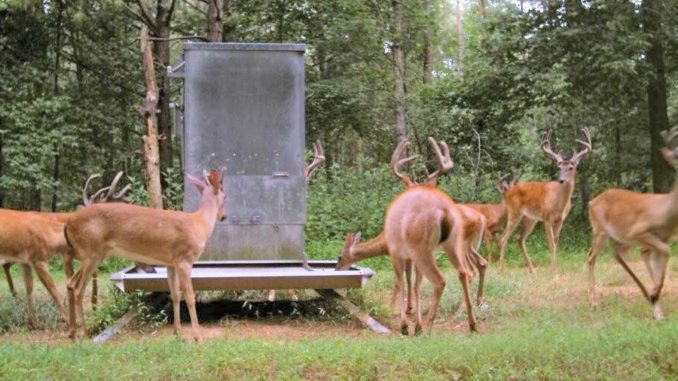
Certified deer farmers, not hunters, will now pay excise tax
Thanks to a Catawba County legislator, North Carolina’s deer hunters have dodged what could have been an expensive bullet in the final days of the N.C. General Assembly’s 2016 session.
Earlier this week, Rep. Jay Adams (R-Catawba) stumbled onto an amendment to the 2016 Farm Bill, SB 770, that would have levied an excise tax on any supplemental deer foods and minerals purchased not only by owners of deer farms but by deer hunters, with proceeds going to the N.C. Deer and Elk Farmers Association, the lobbying group for North Carolina’s 37 captive-cervid farmers.
After Adams discussed the amendment, Section 11, with the bill’s main sponsor, Sen. Brent Jackson (R-Sampson), the language was changed to read that only certified deer farmers would pay an excise tax.
The bill eventually passed the N.C. House by an 89-26 vote on Thursday, and a House/Senate conference committee passed it on for the governor’s signature earlier today.
Adams, who led an unsuccessful fight last fall to keep the oversight of penned-in deer from moving from the N.C. Wildlife Resources Commission to the N.C. Department of Agriculture and Consumer Services, caught a change in a version of the bill coming out of the House’s Agriculture Committee.
“One word, cervid, was dropped,” Adams said. “I got to reading, trying to figure out secret meanings, and I started asking questions.”
Adams said he discovered that a $4 per thousand-pound excise tax didn’t apply solely to purchases of supplemental deer food and minerals by deer farmers, but also to hunters. Then, he asked about food plots seed mixes and mineral supplements.
“They said (the tax) would apply to food plots, and it would be 10 cents per bag (of seed mixes),” Adams said. “I said, ‘Wait a minute. That could be a 10-, 20- or 50-pound bag, and that’s not $4 per ton.’ I asked about mineral feed (blocks), and they said, ‘Yes, it would also apply to mineral blocks.’ Now, think of all the mineral products hunters buy.”
Adams said he did some calculating and found that with thousands of hunters in North Carolina buying supplemental food mixes, bags of food-plot seed and mineral blocks, the bill could have raised “a half-million dollars” that would have gone to the N.C. Deer and Elk Farmers Association.
“There was really no way to figure the amount,” said Adams, who introduced an amendment to completely strike Section 11 from the bill that was defeated.
Adams and Richard B. Hamilton, the executive director of the N.C. Wildlife Federation’s Camouflage Coalition and former executive director of the N.C. Wildlife Resources Commission, said that Rep. Roger West (R-Cherokee), got the language inserted in Section 11 that could have added the excise taxes to sportsmen’s purchases of deer food supplements.
“He stuck it in there; I guess he was trying to make a last hurrah,” Hamilton said of West, who is retiring this year after 18 years in the legislature, where he has used his influence to favor cervid farmers who are among his constituents. “He is a very powerful member.
“It’s incredible (the legislature) would even consider such an idea — giving sportsmen’s money to a lobbying group (for cervid farmers), and the sportsmen had no say,” Hamilton said. “It was a crazy idea and probably unconstitutional.”
Public records show that Jackson, the Farm Bill’s main sponsor, received a $5,100 contribution this past Jan. 22 from Tom E. Smith, the former CEO of the Food Lion grocery chain who is president of the N.C. Deer and Elk Farmers Association.



